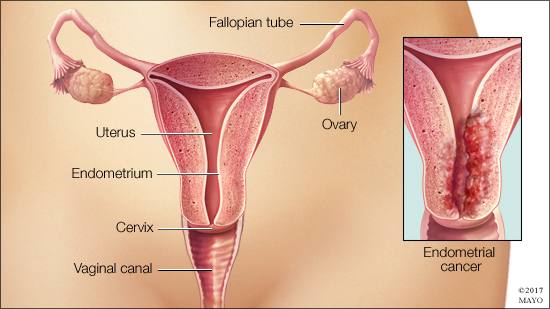-
Cancer
Women’s Wellness: Obesity increases endometrial cancer risk
Endometrial cancer, which begins in the uterus within the layer of cells that form the uterine lining, has been on the rise over the past decade. Each year in the U.S., over 60,000 women are diagnosed with endometrial cancer, also referred to as uterine cancer. Endometrial cancer is now the most common cancer to affect the female reproductive tract, and many studies suggest that the increase is linked to the rise in obesity.

"A majority of endometrial cancers will develop and grow in response to estrogen. Obesity increases estrogen levels, and the higher the estrogen, the greater a woman's risk," says Dr. Jamie Bakkum-Gamez, Mayo Clinic gynecologic oncologist.
Another risk factor is hormone therapy.
"Women with a uterus who take estrogen-only hormone replacement therapy are at increased risk of developing endometrial cancer," says Dr. Bakkum-Gamez, noting the average age of women diagnosed with endometrial cancer is 60. This risk is reduced, though, when progesterone is added to the hormone replacement regimen.
"Other medical conditions that change the balance of estrogen and progesterone in the body can also increase a woman's chance of developing endometrial cancer since fluctuations in the balance of these hormones can cause changes in the endometrium," says Dr. Bakkum-Gamez.
Women diagnosed with polycystic ovary syndrome and diabetes, as well as those who have high blood pressure or high cholesterol, also have an elevated risk for endometrial cancer. Also, women who go through menopause at a later age have been shown to be at higher risk.
Journalists: Broadcast-quality video pkg (:59) is in the downloads at the end of the post. Please courtesy "Mayo Clinic News Network." Read the script.
The most common symptom of endometrial cancer is abnormal vaginal bleeding.
At this time, no screening test is available for endometrial cancer. When symptoms appear, a sample of the endometrial tissue has to be removed and examined, or biopsied, to determine whether a woman has endometrial cancer.
But Mayo Clinic researchers are hoping to find a new, less invasive way to identify this cancer.
Dr. Bakkum-Gamez is leading a study that is investigating the effectiveness of using a tampon to help detect this type of cancer in its earliest stages. The earlier the stage an endometrial cancer is diagnosed, the higher the chance is of cure.
"We are collecting and examining samples of vaginal fluid via a tampon for diagnosing endometrial cancer early. The results of the study are showing promise, and a larger clinical trial is under development," says Dr. Bakkum-Gamez.
In the meantime, she adds that if women experience abnormal vaginal bleeding, such as bleeding after menopause, bleeding between periods or unusual blood-tinged discharge, they should seek an evaluation.
"My other advice is to maintain a healthy lifestyle, including diet and exercise. We know that eating well, exercise and maintaining a healthy body weight can reduce your risk for all cancers," says Dr. Bakkum-Gamez.







